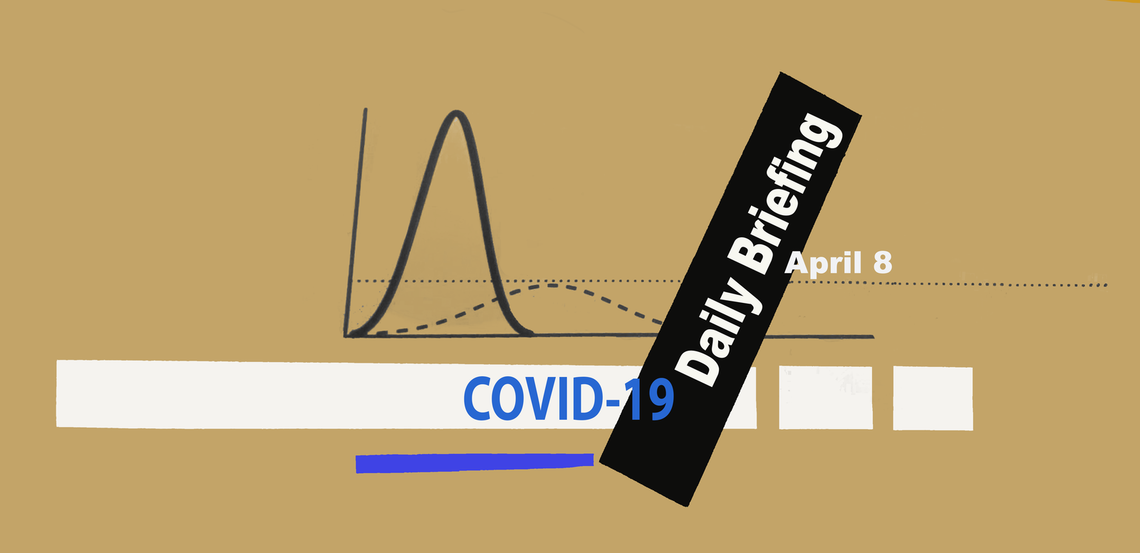
Total number of people infected with COVID-19: 881
Total number of recovered: 114
Total number of deaths: 9
Mobile Phone Tracking
4:30 p.m.
During a press conference, Bagrat Badalyan, advisor to Deputy Prime Minister Tigran Avinyan, spoke about the digital tools being used in the fight against the spread of coronavirus. Regarding the mobile phone tracking tool, Badalyan said the information made available to them by telecommunication operators helps trace the contacts of the patient. The information is only available to people working in the system and is then compared with the contact tracing results acquired by doctors through questionnaires. If necessary, additional interviews are conducted. When new contacts are discovered, they too are required to self-isolate. Badalyan said this system was put into motion on April 7 and they expect to have the list for the first group of people to be notified to self-isolate later in the day.
The data collected through this system will be destroyed within three weeks after the state of emergency is lifted. The special commission will ask members from each of the parliamentary factions to be present when the data is destroyed. Badalyan said the data will not simply be deleted but the servers will also be physically destroyed.
For people already in state-mandated self-isolation, Badalyan said information about the person’s health and food supplies are compiled. When there is a need, the government is also providing food to those in self-isolation. Several times a day, those in self-isolation also receive a message with a link through an app and, by clicking on it, are required to answer questions about their health and confirm their identity (by sending in a photograph). During that time, their location is identified to make sure they have not left the address of their self-isolation. The messages are sent on a randomly generated schedule to make sure the person in self-isolation is not able to circumvent the system. If the system discovers that the person has left the location of their self-isolation, an automatic message goes out to the police. There will be an administrative fine for people who break the rules of self-isolation; if repeated, the person will be quarantined. If the questionnaire about the person’s health raises concerns, the information is passed on to the Ministry of Health; in turn, ministry staff will conduct an additional interview with them to confirm the concerns. If they find that the person is exhibiting symptoms, then they will be tested. Badalyan said that if the person in self-isolation does not own a smartphone or have Internet connection, the questionnaire is filled out over the phone and Armenia’s Internet providers have expressed readiness to provide people in self-isolation with free Internet for the duration of their isolation.
Badalyan also spoke about the COVID-19 Armenia app (Google Play, AppStore). The app has had about 40,000 downloads, about 240,000 questionnaires have been filled out through the app. About 1,500 people using the app have had concerning results (in the red zone), 31 people were flagged for testing after phone interviews with health professionals; 12 people out of the 31 have already been tested with four positive and eight negative results.
Badalyan said these digital tools did not cost the government any funds; they were created voluntarily by Armenian IT companies.
Loan Repayment Holiday
1:40 p.m.
Prime Minister Nikol Pashinyan wrote in a Facebook post that as of April 8 about 290,000 citizens of Armenia have been granted loan repayment holidays in the amount of 9.3 billion AMD. Additionally, repayment holidays were also granted to 5,300 corporations in the amount of 15.4 billion AMD.
IT Sector, Engineers and Ventilators
Updates on COVID-19 Cases
11:05 a.m.
Prime Minister Nikol Pashinyan wrote on his Facebook page that 28 new cases of COVID-19 were confirmed following testing on 311 people, bringing the total number of cumulative cases to 881 in Armenia.
Twenty-seven people have recovered, bringing the total to 114 recoveries; 758 COVID-19 patients are still in recovery and 90 percent of patients have no fever.
Pashinyan also wrote that the numbers continue to give cause for cautious optimism. If similar statistics persist, he wrote, then it would indicate that Armenia reached its peak on March 31.
There has also been one death, a 93-year-old patient, who had cancer. Eight patients continue to remain in extremely critical condition.
Return of Armenian Citizens from Russia
Russian Specialists Arrive in Armenia
April 7
The Spokesperson for Armenia’s Defense Ministry stated that, within the framework of bilateral cooperation and per the agreement reached between the Defense Ministers of Armenia and the Russian Federation, David Tonoyan and Sergei Shoygu, on the exchange of knowledge and practice in the fight against the spread of COVID-19, a team of specialists from Russia have arrived in Armenia.
The Russian team arrived with a portable laboratory equipped with COVID-19 sampling and testing capacity. The system will allow the RA Ministry of Defense to carry out tests within the Armenian armed forces and the personnel of the 102nd Russian military base located in Gyumri.

